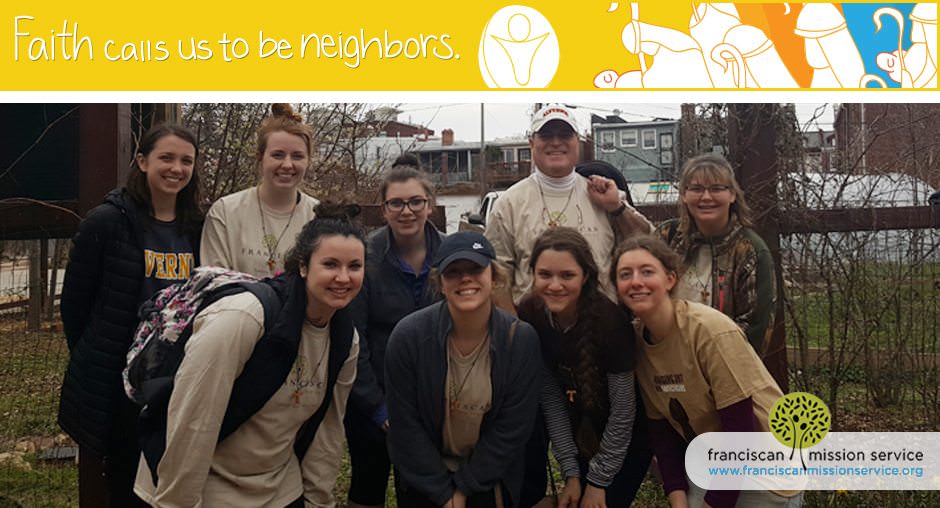Faith Calls Us to be Neighbors: Relationships, Community, Involvement, Learning

Editor’s note: Joseph J. Cicala, Ph.D., is the Vice President for University Life and Dean of Students at Alvernia University and accompanied Alvernia students on a DC-based FMS service trip last spring. As a guest blogger for FMS’ 2017 Advent blog series, Joe reflects on God’s intentions for us and how Jesus came to live out these intentions as an example.
Early in my career as Vice President for University Life and Dean of Students at Alvernia University, it was my privilege to be a member of what our president christened the “Franciscan Learning Community.” It was a group of faculty, staff, and administrators, working with our Bernardine Franciscan Sisters to deepen our understanding of the Franciscan charism and, by doing so, to enhance our work, individually and collectively, and to deepen the connections between the spiritual and secular missions of the university…which really are not separate paths at all, of course. But, like Dorothy from The Wizard of Oz, we had to learn that for ourselves.
My approach to student learning and development in higher education is summed up in a paradigm that I call “relationships, community, involvement, learning.” It is essentially gleaned from my interpretations of the works of noted scholars Vincent Tinto, George Kuh, Alexander Astin, and others, but it also has been deeply enhanced by the Franciscan and Lasallian Catholic traditions of the two institutions at which I have served as chief student affairs officer. Learning is understood as the result of a student’s involvement (defined by Astin as “the quantity and quality of the physical and psychological energy that the student devotes” to the academic enterprise); involvement is best fostered in atmospheres of community; and community is built from positive personal relationships, particularly those between and among students, faculty, and staff.
So many of the lessons learned, first in the Christian Brothers’ Lasallian Leadership Institute and more recently in Alvernia’s Franciscan Learning Community, have helped me further hone my understanding of—and, so, my ability to further animate—the synergies between key elements of those traditions’ spirituality and pedagogy and the fundamentals of my secular studies and practice. During my years of service at La Salle University, for example, my understanding of the impact of community was deeply enhanced by what I learned of the bedrock Lasallian principle of “association.” Here at Alvernia, I have learned that the importance of relationships goes far, far beyond the utilitarian.
I learned that St. Bonaventure speaks to us over the centuries, teaching us the foundational principle that knowledge must be joined with love, calling upon us to see—to know—that the scholarly and the spiritual go hand in hand when we are truly human. In many ways, that is an application in the academy of the call of St. Francis himself to live life as Jesus did, following those two commandments on which, in Matthew’s account, “hang all the laws and all the prophets”: to love God with all our hearts, with all our minds, and with all our souls, and to love our neighbors as ourselves. And it is in the calls of Francis and Christ that we see quite clearly that God’s intentions for us are rooted in relationships…between God and each (and all) of us and between all of us as members of the human family that He created and sustains.
And so, it is incumbent upon each of us to both realize and act in accordance with God’s intentions for us. It is only in opening our hearts and our minds to others, welcoming them into relationships of love, that we are truly human. And, particularly in this season of Advent, we are called to reflect upon and to be further inspired by God’s own exemplification of his intentions for us. He became truly human and lived among us…beginning on that cold winter’s night…under that shining star. This Advent, as we prepare to symbolically welcome him anew, let us further strive to welcome one another…in our classrooms, on our campuses, in our congregations, and in our communities.
Reflection question: How can you welcome someone into your life today?
Tagged in:
